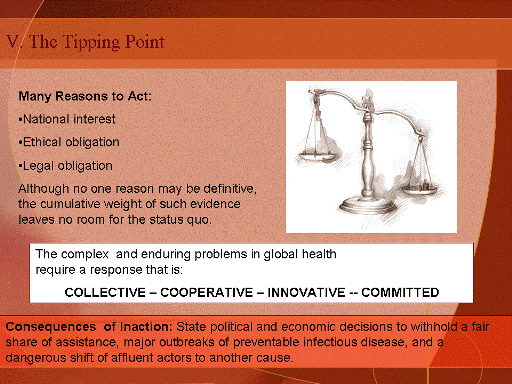Search for most updated materials ↑
 |
front |1 |2 |3 |4 |5 |6 |7 |8 |9 |10 |11 |12 |13 |14 |15 |16 |17 |18 |19 |20 |21 |22 |23 |24 |25 |26 |27 |28 |

I have sought to
demonstrate why politically and economically powerful countries
should care about the world’s least healthy people. It may be a
matter of national interest, so that helping poor States makes
everyone safer and more secure. Or, global health assistance simply
may be ethically the right thing to do to avert an unfolding
humanitarian catastrophe. Or, there may be a growing sense of legal
obligation, whether through WHO treaties and regulations or the
international right to health. Although no single argument may be
definitive in itself, the cumulative weight of the evidence is now
overwhelmingly persuasive. Whatever the reasons, perhaps we are
coming to a tipping point where the status quo is no longer
acceptable and it is time to take bold action. Global health, like
global climate change, may soon become a matter so important to the
world’s future that it demands international attention, and no State
can escape the responsibility to act.
If that were the case,
States would need an innovative international mechanism to bind
themselves, and others, to take an effective course of action.
Amelioration of the enduring and complex problems of global health
is virtually impossible without a collective response. No State or
stakeholder, acting alone, can avert the ubiquitous threats of
pathogens as they rapidly migrate and change forms. If all States
and stakeholders voluntarily accepted fair terms of cooperation
through a FCGH, then it could dramatically improve life prospects
for millions of people. But it would do more than that. Cooperative
action for global health, like global warming, benefits everyone by
diminishing collective vulnerabilities.
The alternative to fair
terms of cooperation through a Framework Convention is that everyone
would be worse off, particularly those who suffer compounding
disadvantages. Absent a binding commitment to help, rich States
might find it politically or economically easier to withhold their
fair share of global health assistance, hoping that others will take
up the slack. Major outbreaks of infectious disease, including
extensively drug resistant forms, would become increasingly more
likely. Even if the economically and politically powerful escaped
major health hazards, they would still have to avert their eyes from
the mounting suffering among the poor. And they would have to live
with their consciences knowing that much of this anguish is
preventable.
What is most important is
that if the global community does not accept fair terms of
cooperation on global health soon, there is every reason to believe
that affluent States, philanthropists, and celebrities simply will
move on to another cause. And when they do, the vicious cycle of
poverty and endemic disease among the world’s least healthy people
will continue unabated.
|